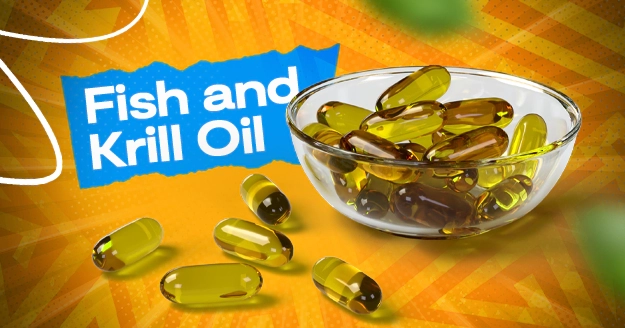Is krill oil the same as fish oil?
Fish oil comes from fatty fish like salmon, tuna, mackerel, herring, and anchovies. Krill oil comes from a small marine animal that resembles a shrimp. Both are rich in two omega-3 fatty acids: Eicosapentaenoic acid (EPA) and docosahexaenoic acid (DHA)
Benefits of Fish Oil and Krill Oil
Omega-3 fatty acids are present in both fish oil and krill oil.
- Manage arthritis symptoms
People with rheumatoid arthritis and osteoarthritis (OA) may get relief from their severe symptoms by taking omega-3 fatty acids.
According to a 2020 study, fish oil reduced chronic pain and increased general well-being in OA patients who were obese or overweight.
- Helps Lower Blood Pressure
Numerous studies show that people who use fish oil supplements have mild drops in blood pressure. There is some evidence suggesting that those with moderate to severe high blood pressure may benefit from fish oil more than those whose blood pressure elevation is modest.
- Helps Protect Eye Health
Omega-3 supplements are sometimes used by people to improve eye moisture and lessen the signs and symptoms of dry eye illness. Fish oil helps with the proper drainage of intraocular fluid from the eye. This can lower the chance of developing high eye pressure.
- Helps Reduce Inflammation
Fish oil contains omega-3 fatty acids. These fatty acids can reduce the release of several elements that play an aspect in inflammation.
It has been demonstrated that omega-3 fatty acids, such as those in krill oil, have a significant anti-inflammatory role in the body. Since krill oil seems to be more readily absorbed by the body, it may be even more effective in reducing inflammation than other marine omega-3 sources.
- Reducing high triglyceride levels
Triglycerides are waxy fats. Taking certain prescription fish oil medications orally lowers extremely high triglyceride levels.
Risks of Fish Oil and Krill Oil
It appears that taking omega-3 supplements in the form of krill oil or fish oil doesn’t have any serious adverse effects.
Minor side effects can include:
- Upset stomach
- Decreased appetite
- Heartburn
- Bloating
- Diarrhea
- Nausea
- Bad breath or fish burps
- Headache
- Unpleasant-smelling sweat
It’s also important to remember that omega-3s have mild anticoagulant or blood-thinning effects. This means that krill and fish oil have the potential to interact negatively with medications that cause blood thinning, such as warfarin.
Blood clotting can be slowed by krill oil. It could make bleeding more likely both during and after surgery. So, take a break from consuming krill oil at least 2 weeks before the operation.
Krill Oil vs Fish Oil
You’ve probably heard it before. It is essential to make sure we are including omega-3 fatty acids in our diet. Multiple benefits include decreasing bad cholesterol, promoting heart health, supporting brain health, and reducing inflammation. The body can’t create omega-3 on its own, so including them in your diet is important. Krill and fish oil are excellent sources of omega-3.
Now, let’s talk about krill oil vs fish oil.
While supplements made from fish oil are often yellow or gold in color, krill oil has a distinctive red hue. Fish oil is often less costly than krill oil.
Astaxanthin is an antioxidant that is unique to krill oil and is not found in the majority of fish oils. The anti-inflammatory and antioxidant characteristics of astaxanthin can have some positive effects on heart health.
It was discovered that krill oil and fish oil both improved several risk factors for heart disease. But several studies have shown that krill oil can enhance heart health to a greater extent. Additionally, research also discovered that krill oil is superior to fish oil at reducing triglycerides, “bad” LDL cholesterol, and blood sugar.
We have mainly talked about the advantages of krill oil. Now, let’s find out why fish oil might be the one for you.
One advantage of fish oil over krill oil is the fact that fish oil is often far more affordable and widely available.
Krill vs fish oil, which should you take?
Overall, both supplements are excellent providers of omega-3 fatty acids, and solid evidence backs their positive effects on health.
If you have the extra money to spend, then you can buy krill oil which is better absorbed by the body and is more effective than fish oil, according to some studies.
However, it could make the most sense to supplement with fish oil given the significant price difference and limited scientific evidence that krill is superior to the other.
Dosage Recommendations
Ingesting doses of more than 900 mg of EPA and 600 mg of DHA daily can lower a person’s immune system by inhibiting natural inflammatory responses.
The Office of Dietary Supplements (ODS) estimates that males should consume 1.6 g of omega-3 fatty acids daily, while women should consume 1.1 g.
The ODS also advises against taking more than 2 g of EPA and DHA per day in dietary supplements. To know exactly how much EPA, DHA, and other ingredients are in each capsule, you should carefully read the supplement labels.









